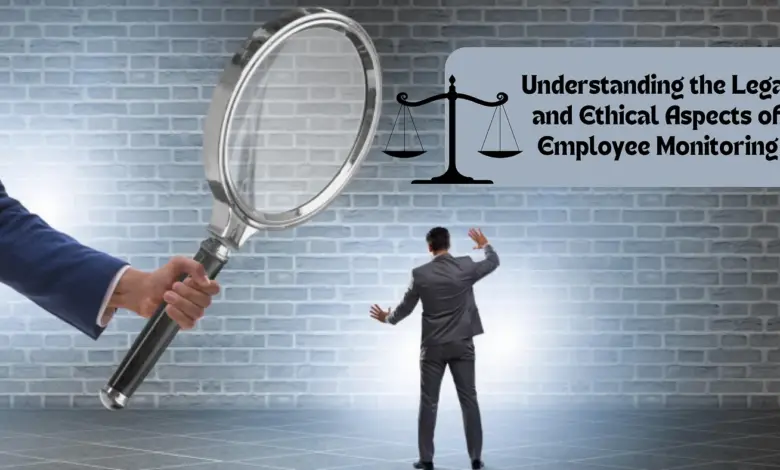The Legal and Ethical Aspects of Employee Surveillance

Ethics and legality must be balanced in employee monitoring. It has to do with maintaining security and efficiency without compromising privacy. Local laws set different bounds, and moral behavior prioritizes openness and worker confidence.
Recognizing the Legal Environment
Laws pertaining to employee monitoring varied greatly between jurisdictions. Employers are permitted to monitor verbal and electronic conversations in the United States, for example, under the terms of the Electronic conversations Privacy Act (ECPA). The notion of “business purpose” is crucial in this case; surveillance is often allowed if the employer has a justifiable business need. State legislation, however, may add further levels of intricacy. For example, prior to any monitoring taking place, several governments demand the consent of the employees.
Employers are required to make the extent and goal of monitoring crystal apparent. Additionally, they have to make sure that the data is only used for the intended purpose and is not gathered in excess. There’s a thin line separating privacy rights violations and productivity tracking.
The Implications of Monitoring for Ethics
Employee surveillance is a morally and legally complex matter. The privacy and trust question is at the center of the matter. Companies must ask themselves: What is the limit? It makes sense to monitor in order to guarantee efficiency and protect business assets. But at what point does it qualify as a privacy invasion?
The effect on staff morale is one important ethical factor. Employers must explain in detail what and why they are monitoring. This candor can support the upkeep of a workplace culture built on trust.

The equitable and nondiscriminatory use of monitoring data is an additional factor. Employers are responsible for making sure that monitoring data is handled fairly and doesn’t influence judgments or assessments. Ethical monitoring procedures ought to be open, equitable, and mindful of the effect on workers’ welfare. Employers ought to make an effort to design a monitoring system that satisfies operational requirements while maintaining individual privacy.
The Best Methods for Open Monitoring
Transparency is essential for upholding ethical standards and preserving confidence while adopting employee monitoring. It all comes down to finding the ideal balance between the demands of the business and employee privacy. Consider the following best practices:
Clear Policy Communication: Create a clear policy before putting monitoring instruments into use. Workers must be completely informed about the monitoring procedure and its justifications.
Employee Consent: Ask employees for their express consent. In many places, this is not only required by law, but it is also a moral obligation that upholds respect and trust.
Limit the amount of data gathered: Only gather the information required to achieve the specified goal. Steer clear of going above what is necessary in terms of information collection, as this might violate privacy and undermine confidence.
Frequent Reviews and Updates: Monitor policies on a regular basis to make sure they are still applicable and considerate of privacy concerns. Make employees feel like they are a part of the process by including them in these appraisals.
Data Security: Make sure that the information gathered via observation is safely kept off the internet and shielded from unwanted access. This is essential to preserving confidence and safeguarding employee privacy.

Employee Rights and Privacy Concerns
The right to a private life comes in second. Employees have the right to have personal space and leisure, even in the workplace. The extent to which an employer may encroach in this area is governed in the United States by the ECPA and other state statutes.
Lastly, employee rights must be respected in the use of data obtained through monitoring. This entails making certain the information is shielded from unwanted access and isn’t utilized for discriminatory purposes. For example, in the United States, regulations like HIPAA establish standards for the handling of private, sensitive data in the workplace.
The Effects of Technological Tools
The field of employee monitoring has seen a considerable transformation with the introduction of modern technological instruments. These tools might be as basic as time-tracking software or as complex as sophisticated systems that keep an eye on emails, the internet, and even physical activities. They have many advantages in terms of security and efficiency, but they also bring up significant issues with regard to employee welfare and privacy.
Software for Tracking Time: These devices keep track of how much time staff members spend on different duties. Even if productivity analysis and project management can benefit from them, using them excessively for performance evaluation can lead to tension and strain.
Location Tracking: GPS tracking might be helpful for jobs that need mobility. However, in order to protect private and personal time, this should only be done during working hours.
Keystroke Logging: To monitor employee computer usage, several businesses utilize keystroke recorders. This is one of the more invasive techniques, and if it’s not well explained and justified, it may be viewed as a betrayal of confidence.
Final Thoughts
These technical instruments have a significant impact. Although they provide insightful information and security advantages, they must be weighed against the needs of trust and privacy. Employers must utilize these technologies carefully and make sure that workers are aware of and comprehend the objective of the monitoring. By doing this, businesses may take use of technology while preserving a polite and happy work environment.
Source Links:
https://controlio.net/employee-monitoring.html
https://en.wikipedia.org/wiki/Employee_monitoring
https://www.pcmag.com/picks/the-best-employee-monitoring-software



